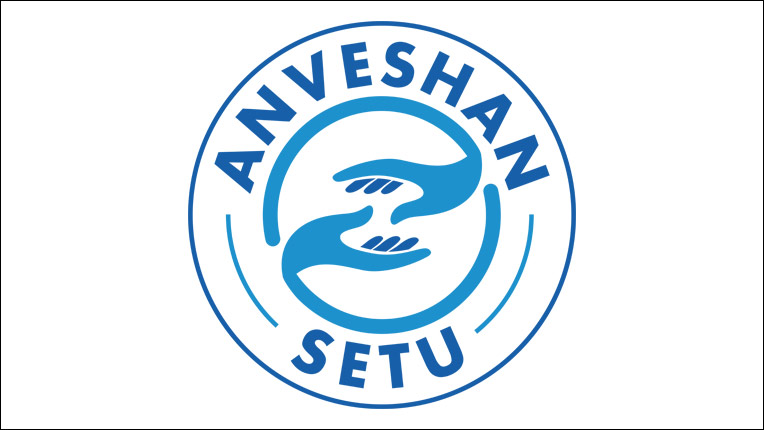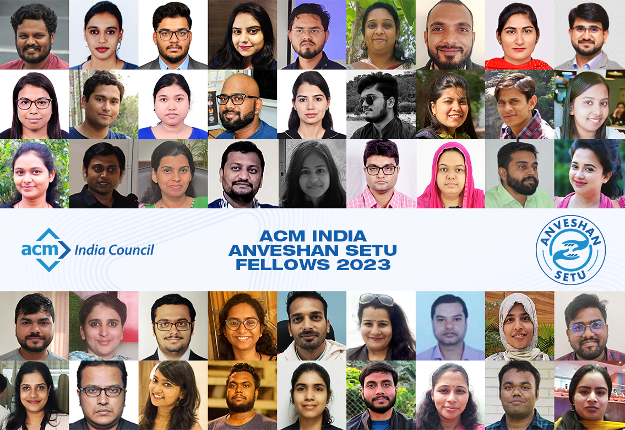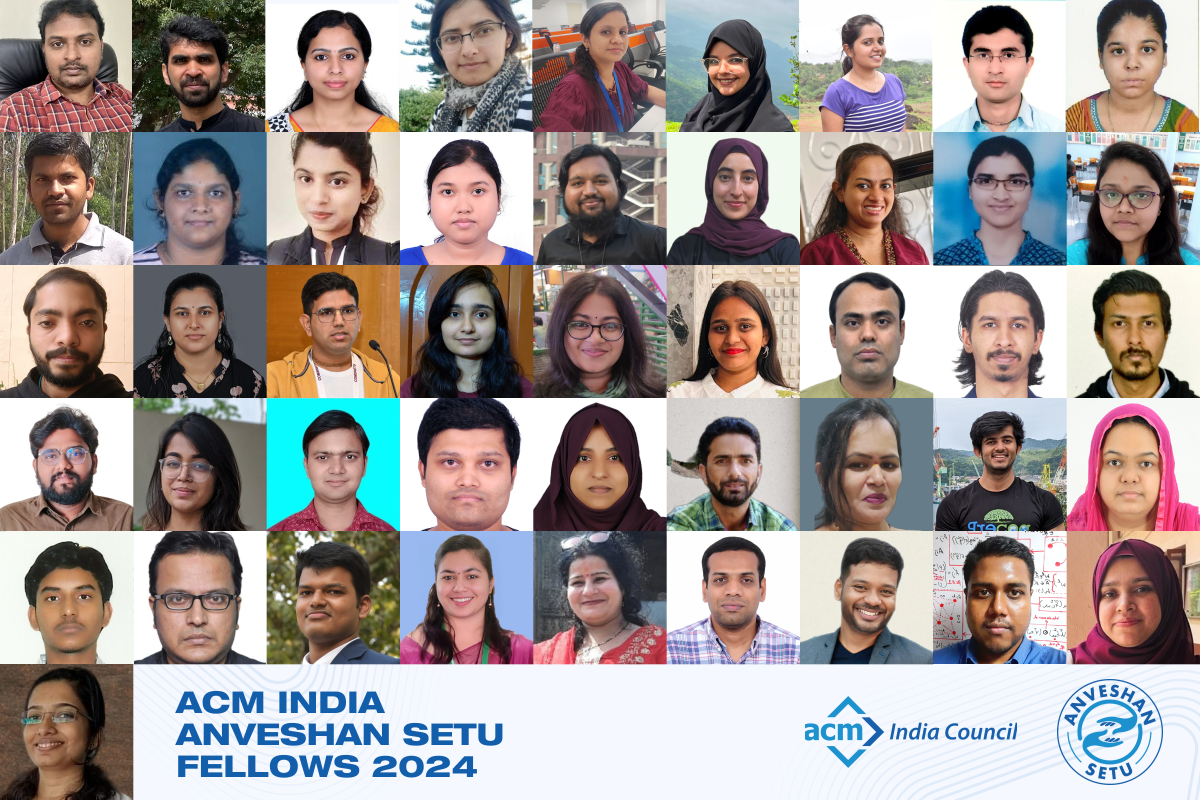About the ACM India Anveshan Setu Fellowship
Objectives of the Fellowship
- To provide CS/IT PhD students in India:
- an opportunity to get up close and personal with best research practices outside their parent institutes.
- a longer and more intense mentoring experience beyond ACM India PhD Clinic.
Eligibility for Students and Mentors
- Student: Any full-time/part-time enrolled/registered CS/IT PhD student in India.
- Mentor: Faculty member with established research credentials in India, willing to host and mentor a visitor student for four weeks.
- It is preferred that a mentor-mentee pair would have interacted in the past through other fora/platforms, viz. PhD Clinic.
- A mentor will be matched with a mentee only if both sides are agreeable to the match.
Salient features of the Fellowship
- Duration of the visit: We recommend a minimum of four weeks in a year per visit. Depending on the performance, mentee/student can be allowed to visit same or different mentors up to three times in three years, during the PhD career of the student.
- It is expected that at the end of minimum four-week visit, the mentee will have a better understanding and perspective of research methodology and practices in her/his area of interest, develop taste and enthusiasm for exploring an area of her/his interest in depth, and expand her/his network of academic contacts.
- Depending on the interest by the mentor and mentee, ACM India will do the matchmaking. Explicit approval from the mentor will be taken before assigning a mentee.
- Mentor and mentee are expected to meet a minimum set of expectations. The guiding principle of these expectations is to ensure that the mentee learns best research practices and feels more comfortable and encouraged in pursuing her/his/their research at the end of the visit.
Expectation from Mentors
- Facilitate logistics of mentee's visit:
- Office space/desk, access to building/lab, internet access, access to library (for reading, not necessarily for issuing books)
- Access to student hostel/guest house accommodation and mess/canteen facilities. Financial support from ACM India is available for this.
- Have the mentee participate in group meetings, presentations, etc. as a visitor.
- Spend at least 1-2 hours per week with the mentee on his/her work, giving feedback on research, helping progress with work.
- Have other students in the mentor's research group spend some structured time with the mentee explaining what they are working on, pitfalls to avoid, best practices to pick up, etc.
- Have a joint video/teleconference with mentee and her/his/their advisor in her/his/their parent institution at least once (preferably in the first week) during the visit to ensure that all are on the same page.
- Provide a Completion Letter (see template) to the mentee on institute letterhead, on completion of the visit.
- Give feedback to ACM India about what worked and what didn't work; a separate form will be shared with mentors for this purpose.
Expectation from Mentees
- Mentee must have discussed the visit with her/his/their advisor and comply with all requirements of advisor and parent institution.
- Mentee must submit a no-objection-certificate (see template) from the advisor.
- Given that this is a full-time visit, mentee must spend a minimum of 40 hours per week interacting with the mentor and her/his/their research group, trying to understand research methodologies and best practices.
- Participate as a visitor in group meetings, presentations etc. of the mentor's group.
- Stay in close touch (preferably weekly) with an advisor in the parent institution about work/activities being done in the visiting institute.
- Prepare a report (format to be provided by ACM India) of outcome of the visit at the end of the duration of visit.
- Give feedback to ACM India about what worked and what didn't work; a separate form will be shared with mentees for this purpose.
- Possibly participate in ACM India events and present her/his/their work and experience from the visitor program.
Tentative Timeline
| Apr. 2025–Mar. 2026 | Student visits Mentors |
Cycle 2
|
By 8 Sept. 2025 |
Applications open |
|
By 15 Oct. 2025 |
Last date for submitting applications |
|
By 31 Oct. 2025 |
Application review, interaction between potential students, mentors |
|
By 8 Nov. 2025 |
Announcement of Fellows |
|
Nov. 2025–Mar. 2026 |
Student visits Mentors |
Other guidelines
- ACM India will have no stake in the produced IP through this collaboration/visit of the mentee to the host institution and beyond.
- Mentors and students should publish the findings from the visit and beyond in the public domain.
- If the mentor and mentee mutually agree to extend an Anveshan Setu visit beyond four weeks, and if the mentee’s advisor and parent institution are agreeable to this, and if the mentee and mentor mutually agree to take care of expenses related to stay beyond the four weeks supported by ACM India, it is possible to extend the mentee’s visit beyond four weeks. In all such cases, ACM India’s financial support will however be capped to a total of Rs. 25,000 as specified below.
- We plan to support up to 50 students in the 2025–2026 cycle of the Fellowship.
Financial details
- ACM India will provide INR 15,000 to the student at the start of their visit.
- When the student completes the visit, she/he/they will submit a report along with pictures (with mentor, students, lab, etc.) taken during the visit, and ACM India will provide an additional INR 10,000 to the student.
Definitions
- Mentor/Faculty: Faculty member of the institute to whom the student visitor is assigned.
- Candidate/Student/Mentee: A student from another institute getting the Anveshan Setu Fellowship to pursue research with the mentor at the institute.
- Grant: Cash grant named Anveshan-Setu Fellowship provided by ACM India to the institute to fund the candidate's visit and research project.
- Research topic: Plan agreed between the mentor and the candidate to work on. This could be a 2-3 line description of the topic of research.
List of mentors for 2025–2026
|
Name |
Institute |
Areas |
|
Abhijnan Chakraborty |
IIT Kharagpur |
Responsible AI, Social Computing, AI and Law |
|
Anirban Dasgupta |
IIT Gandhinagar |
Resource efficient ML, Tensor decompositions in ML, Quantum ML |
|
Antony Franklin |
IIT Hyderabad |
Mobile Networks (5G/6G), Mobile Edge Computing, C-V2X |
|
Arijit Roy |
IIT Patna |
Internet of Things (IoT), Virtualization, Machine Learning for Fog and Edge Computing |
|
Aritra Banik |
NISER Bhubaneswar |
Computational Geometry, Parameterized Algorithms, Approximation Algorithms |
|
Arun Balaji Buduru |
IIIT Delhi |
Affective AI, Usable Security and Computational Linguistics |
|
Ashutosh Modi |
IIT Kanpur |
Natural Language Processing (NLP), LLMs, Causal Reasoning |
|
Asif Ekbal |
IIT Patna |
Natural Language Processing, Multimodal AI, Large Language Models |
|
Ayan Mondal |
IIT Indore |
Edge-Cloud Computing, Software-Defined Networks, IoT |
|
Bheemarjuna Reddy Tamma |
IIT Hyderabad |
5G and Beyond Mobile Networks; Network Softwarization; Cyber Security; |
|
Hari Prabhat Gupta |
IIT (BHU) Varanasi |
Edge Computing, Tiny Machine Learning, IoT |
|
Jainendra Shukla |
IIIT Delhi |
Affective Computing, Social Robotics, Ubiquitous Computing |
|
Karthik Vaidhyanathan |
IIIT Hyderabad |
Green Software, Sustainable AI systems, self-adaptive systems |
|
Krishna Pillutla |
IIT Madras |
Privacy in AI, Robust AI, Evaluation of Generative AI |
|
M. Tanveer |
IIT Indore |
Machine learning; deep learning; applications to Alzheimer's disease |
|
Maunendra Sankar Desarkar |
IIT Hyderabad |
NLP, Recommendation Systems, Information Retrieval |
|
Ponnurangam Kumaraguru |
IIIT Hyderabad |
Applied ML, Applied NLP, Responsible AI |
|
Raghava Mutharaju |
IIIT Delhi |
Ontology Modelling, Knowledge Graphs, Neurosymbolic AI |
|
Ramakrishna Upadrasta |
IIT Hyderabad |
Compilers, Polyhedral Compilation, ML for Compilers, Program (Source/Binary) Embeddings |
|
Ranveer Singh |
IIT Indore |
Algebraic computation, algebraic graph theory, graph algorithms |
|
Rinku Shah |
IIIT Delhi |
Data center networking, SDN, Programmable networking |
|
Sachin Chaudhari |
IIT Hyderabad |
IoT for Smart Cities, Agriculture and Education |
|
Samaresh Bera |
IIT Jammu |
SDN, NFV, 5G/6G Network Security |
|
Sandeep Kumar Shukla |
IIT Kanpur |
Cyber Security, Cyber Crime Prevention, Analysis and Forensics, Blockchain technology |
|
Sathya Peri |
IIT Hyderabad |
Blockchains, Parallel Programming, Multi-Core Systems Security, Distributed Computing, Decentralized Federated Learning |
|
Smruti Sarangi |
IIT Delhi |
Computer architecture, operating systems, distributed systems |
|
Sourangshu Bhattacharya |
IIT Kharagpur |
Scalable Machine Learning, Subset-Selection in AI, Trustworthy AI |
|
Sridhar Chimalakonda |
IIT Tirupati |
Generative AI and Software Engineering Human-Computer Interaction Computing for Society |
|
Sridhar Iyer |
IIT Bombay |
CS Education Research; Education Technologies; Teacher Education |
|
Sudarshan iyengar |
IIT Ropar |
AI for social good. Edtech. |
|
Sudip Misra |
IIT Kharagpur |
Wireless Sensor Networks, Internet of Things. |
|
Sujata Pal |
IIT Ropar |
Blockchain, Applications of ML/AI in systems, IoT |
|
Supratik Chakraborty |
IIT Bombay |
Formal verification, automated synthesis, formal methods in machine learning |
|
Swaprava Nath |
IIT Bombay |
Algorithmic Game Theory, Algorithmic Mechanism Design, Computational Social Choice |
|
Tamoghna Ojha |
IIT (ISM) Dhanbad |
IoT, edge computing, non-terrestrial networks |
|
Vineeth N Balasubramanian |
IIT Hyderabad |
Deep Learning, Computer Vision, Multimodal Foundation Models, Explainability and Reasoning in AI Models |
|
Yogesh Simmhan |
IISc |
Edge and cloud computing, Scalable ML, Graph analytics |
Fellows and Mentors 2025 - 2026
|
Mentee |
Mentor |
|
Vedula Bhaskara Hanuma, IIIT Hyderabad |
Prof. Abhijnan Chakraborty, IIT Kharagpur |
|
Sohel Aman Khan, IIIT Delhi |
Prof. Anirban Dasgupta, IIT Gandhinagar |
|
Kundan Kumar, BIT Mesra |
Prof. Arijit Roy, IIT Patna |
|
Manohar Choudhary, Dr Harisingh Gour Vishwavidyalaya, Sagar |
Prof. Aritra Banik, NISER Bhubaneswar |
|
Kalaiyarasi N, Anna University |
Prof. Arun Balaji Buduru, IIIT Delh |
|
Abhishek Kant, MNNIT Allahabad |
Prof. Ashutosh Modi, IIT Kanpur |
|
Darshna Parmar, IIIT Vadodara |
Prof. Ashutosh Modi, IIT Kanpur |
|
Pooja Harde, NIT Kurukshetra |
Prof. Ashutosh Modi, IIT Kanpur |
|
Dhanya P, IIIT Kottayam |
Prof. Asif Ekbal, IIT Patna |
|
Prasad Prakash Patil, IIIT Nagpur |
Prof. Asif Ekbal, IIT Patna |
|
Jane George, IIIT Kottayam |
Prof. Jainendra Shukla, IIIT Delhi |
|
Vaishna T, University of Kerala |
Prof. Jainendra Shukla, IIIT Delhi |
|
Kausar Ali, AMU Aligarh |
Prof. M. Tanveer, IIT Indore |
|
Nishtha Tomar, IIT Jodhpur |
Prof. M. Tanveer, IIT Indore |
|
Smita Shende, IIIT Nagpur |
Prof. Maunendra Sankar Desarkar, IIT Hyderabad |
|
Abhijith Balan, NIT Tiruchirappalli |
Prof. Ponnurangam Kumaraguru, IIIT Hyderabad |
|
Jain Rinkal Rajeshkumar, Pandit Deendayal Energy University |
Prof. Ranveer Singh, IIT Indore |
|
Thakkar Bhaumikkumar Mukeshbhai, Pandit Deendayal Energy University |
Prof. Ranveer Singh, IIT Indore |
|
Mr. Payala Krishnanjaneyulu, IIIT Kottayam |
Prof. Rinku Shah, IIIT-Delhi |
|
Anusha Seles S, VIT Chennai |
Prof. Sachin Chaudhari, IIIT Hyderabad |
|
Ramya T, Anna Univeristy |
Prof. Sathya Peri, IIT Hyderabad |
|
Sharon Justine, IIIT Kottayam |
Prof. Sathya Peri, IIT Hyderabad |
|
Param Pratibha, IIIT Delhi |
Prof. Sourangshu Bhattacharya, IIT Kharagpur |
|
Atul Sharma, IIT Mandi |
Prof. Sridhar Chimalakonda, IIT Tirupati |
|
Teslin Jacob, NIT Goa |
Prof. Sridhar Chimalakonda, IIT Tirupati |
|
Naeema Nazar, IIIT Kottayam |
Prof. Sudip Misra, IIT Kharagpur |
|
Vikash Kumar, Central University of Rajasthan |
Prof. Sudip Misra, IIT Kharagpur |
|
Renu Singh, YMCA Faridabad |
Prof. Sujata Pal, IIT Ropar |
|
Greeshma P G, IIT Ropar |
Prof. Swaprava Nath, IIT Bombay |
|
Arshee Naz, NIT Delhi |
Prof. Tamoghna Ojha, IIT (ISM) Dhanbad |
|
Avi Gupta, IIIT Delhi |
Prof. Vineeth N Balasubramanian, IIT Hyderabad |
|
Ranjana Roy Chowdhury, IIT Ropar |
Prof. Vineeth N Balasubramanian, IIT Hyderabad |
|
Aryachandran S, NIT Calicut |
Prof. Yogesh Simmhan, IISc |
|
Sivahari R, VIT Chennai |
Prof. Yogesh Simmhan, IISc |
Apply for 2025–2026
- Apply here
Team
- Dr. Hitkul - Flipkart
- Prof. Ponnurangam Kumaraguru “PK” - IIIT Hyderabad
- Prof. Sudip Misra- IIT Kharagpur
FAQs
Q: I have not yet attended the PhD Clinic, can I apply for this fellowship?
A: Absolutely, you can. We strongly recommend applying to Anveshan Setu Fellowship after attending the Clinic, but it is not mandatory.
Q: Will there be any written test, interviews, for the selection process?
A: No, there may be an interaction session (which could be a PhD Clinic slot too) with the mentor to ensure that you are prepared to make the best use of the visit.
Q: Is there a necessary condition that I can visit only the faculty that I interacted with in PhD Clinic?
A: No, not necessary. You can apply to visit any host faculty mentioned in the application form. Please be aware that this is a matchmaking activity, where host faculty should also be interested in hosting you.
Q: Will I get a lab space/desk to sit and work in the host institute?
A: Depending on the infrastructure facilities of the host institute, you will get some space.
Q: Will I get a hostel in the institute that I will be visiting?
A: Same goes for hostel rooms; be prepared to stay in some hostel type accommodation outside if you don't get a hostel room in the campus.
Q: I just finished my PhD, submitted my thesis, waiting for evaluation/defense, am I eligible for this fellowship?
A: Congrats on submitting the thesis, must be very satisfying. Unfortunately, this program is for PhD students who have not yet reached the final stages of thesis defense.
Q: How much fellowship money will I get?
A: INR 25,000 per student per visit. ACM India will credit INR 15,000 when you start the visit and additional INR 10,000 when you complete the visit and satisfy the requirements (report, pics, etc.).
Q: When can I visit? Should the visit be planned in summer?
A: Visit timing can be planned with the host faculty; both you and the faculty member can decide on the timing for the visit. Visit should happen in the period of April 2025 – March 2026
Q: Do I need to have ACM membership to apply for this fellowship?
A: No, you do not need to be an ACM member to apply. However, for us to disburse the fellowship amount you need to be a member. We encourage non-members to apply, they can become a member once it is known that their application is successful.
Q: I received the Fellowship in the past, but did not visit the mentor because of unforeseen circumstances. Can I apply again this year?
A: If you are still a registered PhD student, you are eligible to apply. We look forward to seeing your application.
Q: I received the Fellowship in the past and I visited the mentor. Can I apply again this year?
A: If you are still a registered PhD student, you are eligible to apply. We look forward to seeing your application.
Q: I received the Fellowship in Cycle 1 this year. Can I apply again?
A: No, each student can only visit once in a financial year. However, you are welcome to apply again in the next cycle year.
Q: I applied in Cycle 1 but was not selected. Can I apply in Cycle 2?
A: Yes, if you are still a registered PhD student, you are eligible to apply again in Cycle 2.
Q: Does the fellowship elapse?
A: Yes, the visit must be completed during April 2025 – March 2026.
Q: Can I visit the mentor for more than 4 weeks?
A: ACM India expects a mentee visit for a duration of 4 weeks, the mentor and mentee can mutually agree (with consent of the mentee's advisor and parent institution) to extend the duration of the visit. If you need any financial support for extending the visit, please reach out to us at ([email protected]) with the request.
Q: I just started my Anveshan Setu visit, how do I get the 15K stipend? What do I need to do?
A: On the first day of the visit, the mentee must fill the visit start form. After the form is submitted, both the mentor and mentee will receive an email notification from ACM India Operations. The mentor should confirm the mentee’s arrival via “Reply-All”, after which ACM shares the claims form to collect the mentee’s bank details.
Q: I submitted my bank details after starting my visit through the link that was shared, by when will I get the 15K?
A: Thank you for sharing your bank details; you should receive 15K within 2 weeks of submitting the form, if you don’t receive it after 2 weeks, feel free to send a reminder email.
Q: I just completed my visit, how I get the 10K stipend? What do I need to do?
A: Mentee prepares a visit report and fills the visit end form. Along with the visit report, mentee would need to upload a picture with the mentor, with the host institute signage in the background. After the form is submitted, both the mentor and mentee will receive an email notification from ACM India Operations. The mentor should confirm the mentee’s arrival via “Reply-All”, after which ACM shares the claims form to collect the mentee’s bank details.


